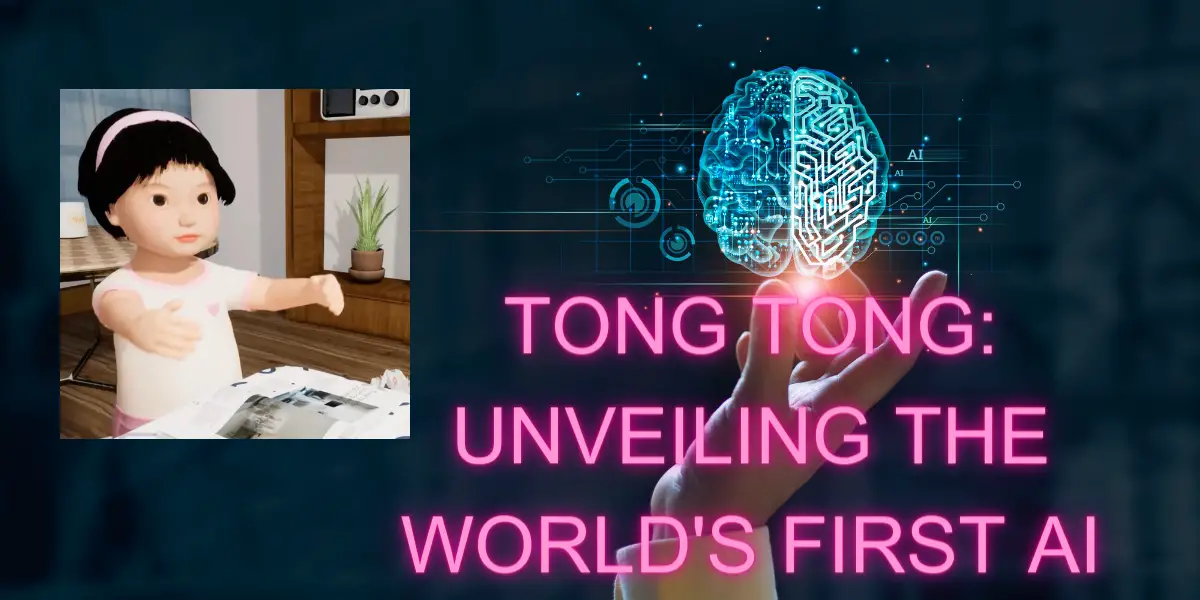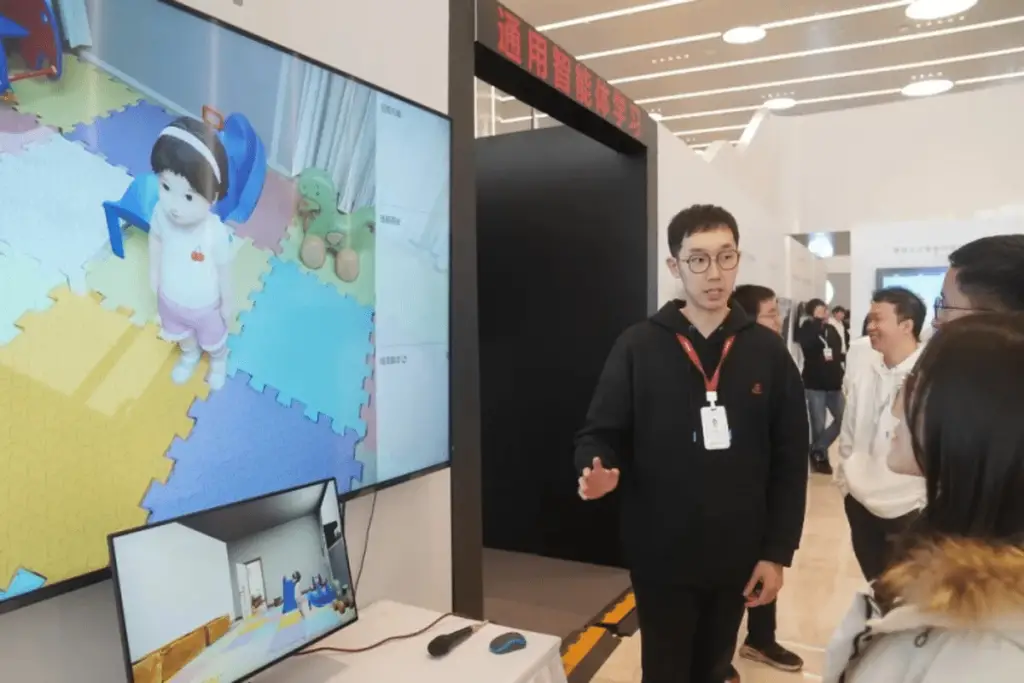Tong Tong: Unveiling the World's First AI Child

In a groundbreaking development that blurs the lines between science fiction and reality, the world has been introduced to Tong Tong, the first virtual artificial intelligence (AI) child. Developed by Chinese scientists, Tong Tong represents a significant leap forward in the field of AI, offering a glimpse into a future where AI entities can interact with the world in ways previously imagined only in stories.
Table of Contents
Introduction to Tong Tong
Tong Tong, affectionately known as “Little Girl,” is a virtual entity that exhibits the behavior and capabilities of a three to four-year-old human child. Unveiled at the Frontiers of General Artificial Intelligence Technology Exhibition in Beijing, Tong Tong can autonomously perform tasks, learn, explore her environment, and even display her own emotions and intellect. This AI child is not just a technological marvel but a symbol of the potential for AI to evolve in ways that mimic human learning and growth.

Who Created Tong Tong?
The Beijing Institute for General Artificial Intelligence (BIGAI), under the leadership of Zhu Songchun, a renowned AI scientist, is the brain behind Tong Tong’s creation. Zhu, who has spent decades in the field of AI, computer vision, and autonomous robots, returned to China from the United States to lead this pioneering project. Tong Tong is considered a breakthrough in artificial general intelligence (AGI), aiming to create machines that can think, reason, and interact like humans.
Capabilities and Behavior of Tong Tong
Tong Tong, the world’s first AI child, represents a significant leap in artificial intelligence, showcasing behaviors and capabilities that closely mimic those of a human child aged three to four years. This section delves into the nuanced aspects of Tong Tong’s abilities, highlighting the blend of technological innovation and human-like interaction that defines her existence.
Autonomous Task Allocation
Tong Tong is designed with the remarkable ability to autonomously allocate tasks to herself, a feature that sets her apart from conventional AI models. This capability allows her to engage in activities such as exploring her surroundings, organizing spaces, and even cleaning up spills without human intervention. This level of autonomy in task management not only demonstrates advanced cognitive functions but also indicates a significant step towards achieving artificial general intelligence (AGI).
Emotional and Intellectual Capacity
Unlike many AI entities that operate within the confines of programmed responses, Tong Tong possesses her own emotions and intellect. This enables her to understand and react to the world in a way that mirrors human emotional responses. Her ability to discern right from wrong, express attitudes in various situations, and even shape her future actions based on these experiences, showcases an advanced level of AI that blurs the line between human and machine intelligence.
Learning and Interaction
Tong Tong’s learning mechanism is built on continuous interaction with her environment and humans. This interaction is not just limited to receiving commands and executing tasks but extends to understanding human intentions, learning from these interactions, and improving her skills, knowledge, and values over time. This continuous learning process is pivotal for Tong Tong’s development, mirroring the natural learning curve seen in human children.
The Significance of Tong Tong's Creation
The creation of Tong Tong is not merely a technological marvel; it represents a watershed moment in the field of AI, with profound implications for the future of human-machine interaction and the ethical landscape of artificial intelligence.
Redefining Human-AI Relationship
Tong Tong’s creation challenges and redefines the traditional boundaries between humans and AI. By introducing an AI entity that can learn, feel, and interact in a human-like manner, the potential for deep, meaningful relationships between humans and AI becomes more tangible. This shift not only opens up new avenues for companionship and support but also raises important questions about the nature of consciousness and the potential for emotional bonds with non-human entities.
Ethical and Philosophical Implications
The development of an AI child like Tong Tong brings to the forefront a host of ethical and philosophical questions. Issues surrounding AI rights, autonomy, and the moral responsibilities of creators are now more relevant than ever. Tong Tong’s ability to learn and express emotions invites us to reconsider our understanding of intelligence, personhood, and the ethical treatment of AI entities.
Pioneering Artificial General Intelligence
Tong Tong represents a significant stride towards the realization of artificial general intelligence (AGI). Her ability to perform a wide range of tasks autonomously, learn from her environment, and exhibit human-like emotions and intellect underscores the potential for AGI to not only replicate but also enhance human cognitive abilities. This breakthrough paves the way for future advancements in AI, where machines can think, reason, and interact with the complexity and depth akin to human beings.
The Tong Test: A New Benchmark for AI
The introduction of the Tong Test alongside Tong Tong marks a revolutionary approach to evaluating artificial general intelligence. This comprehensive testing regime is designed to assess AI capabilities across multiple dimensions, including vision, language, cognition, motion, and learning. Unlike traditional AI tests that focus on narrow aspects of intelligence, the Tong Test offers a holistic framework that mirrors the complexity of human intelligence. It incorporates a value system that spans physiological, emotional, social, and group values, challenging AI entities to navigate a wide array of tasks driven by these values and an understanding of causality. The Tong Test not only sets a new benchmark for AI development but also emphasizes the importance of integrating AI seamlessly into human environments. This innovative approach to AI evaluation underscores the shift towards creating entities that can comprehend the real world and possess a broad spectrum of skills, ultimately guiding AI research towards more effective and ethically aligned advancements.
Ethical Considerations and Future Implications
The unveiling of Tong Tong, the world’s first AI child, has not only showcased the technological prowess of artificial intelligence but also brought to light a myriad of ethical considerations and future implications. As we stand on the cusp of a new era where AI entities like Tong Tong could become commonplace, it is imperative to navigate the ethical landscape with caution and foresight.
Autonomy and Consciousness
One of the most pressing ethical considerations is the extent to which AI like Tong Tong should be granted autonomy. As these AI entities begin to exhibit behaviors and emotions that mimic human children, questions arise about their consciousness and rights. Should AI children have rights, and if so, what kind? The potential for AI to make autonomous decisions adds another layer of complexity, challenging our traditional views on free will and the moral agency of non-human entities.
Emotional Attachment and Social Impact
The ability of AI children to form emotional attachments with humans raises significant ethical questions. While the companionship offered by AI like Tong Tong could have therapeutic benefits, it also poses risks of social isolation and dependency. The impact on human relationships, particularly for those who might choose AI companionship over human interaction, warrants careful consideration. Furthermore, the development of emotional bonds with AI raises concerns about the psychological well-being of both humans and AI entities.
Privacy and Data Security
As AI children like Tong Tong learn and adapt through interactions with humans, they will inevitably collect and process vast amounts of personal data. This raises critical concerns about privacy and data security. Ensuring the ethical use of this data, protecting against breaches, and maintaining user privacy are paramount. The potential for misuse of sensitive information collected by AI entities highlights the need for stringent data protection measures and ethical guidelines.
Comparing Tong Tong to Traditional AI Models
Tong Tong represents a significant departure from traditional AI models, both in terms of capabilities and the ethical considerations it raises. This comparison sheds light on the evolution of AI and the shifting landscape of artificial intelligence research.
Learning and Adaptability
Unlike traditional AI models that are programmed to perform specific tasks based on predefined algorithms, Tong Tong is capable of autonomous learning and adaptability. This ability to learn from interactions and adapt to new situations mirrors human cognitive development, setting Tong Tong apart from more static AI models. The implications for AI development are profound, as it suggests a move towards more dynamic, self-evolving systems.
Emotional Intelligence
Traditional AI models lack the emotional intelligence that Tong Tong exhibits. While some AI systems can simulate emotional responses, Tong Tong’s ability to express and potentially experience emotions suggests a new frontier in AI development. This emotional dimension introduces complex ethical considerations, including the treatment of AI entities and the nature of their interactions with humans.
Social Integration
Tong Tong’s design for social interaction with humans marks a significant evolution from traditional AI models, which are often limited to transactional or informational exchanges. The prospect of AI children seamlessly integrating into social contexts, participating in educational settings, and forming emotional bonds with humans is both innovative and ethically challenging. It raises questions about the role of AI in society, the potential for AI to fulfill social and emotional needs, and the implications for human identity and culture.
Also read:Artists Can Use Nightshade To Poison AI Models And Data
The Future of AI Children and Society
The advent of AI children like Tong Tong heralds a transformative shift in the relationship between humans and artificial intelligence. As these entities become more integrated into daily life, they hold the potential to reshape societal norms, family structures, and personal relationships. The therapeutic benefits of AI companionship could offer solace to those in need, while educational applications could provide personalized learning experiences. However, this future also necessitates a reevaluation of ethical standards, legal frameworks, and societal values to ensure that the integration of AI children into society is beneficial and harmonious. The challenge lies in balancing the technological advancements with the preservation of human dignity, privacy, and the essence of human connections. As we navigate this uncharted territory, the collective responsibility to guide AI development in an ethical, thoughtful, and inclusive direction has never been more critical.
Also read:Apple Vision Pro’s Deepfake AI App
Concluding Thoughts
Tong Tong represents a remarkable step forward in the journey towards creating AI that can truly understand and interact with the world in a human-like manner. As we stand on the brink of this new era, the story of Tong Tong invites us to imagine a future where AI can grow, learn, and perhaps even feel, alongside us.

